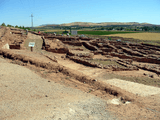Germani (Oretania)
The Germani were an obscure pre-Roman ancient people of the Iberian Peninsula which settled around the 4th century BC in western Oretania, an ancient region corresponding to the south of Ciudad Real and the eastern tip of Badajoz provinces in eastern Andalusia.

Origins
Roman authors did not know that a people of mixed Belgic and Germanic descent had somehow migrated from the Iberian Peninsula around the fourth Century BC.[1][2] Despite the name of the tribe, there is no convincing evidence in favor of their kinship with the Germans. The material culture in their places of residence is typical of the Celts of Iberia. They also included people of Celtiberian and native Iberian-Tartessian affiliation.
Culture

Archeological evidence retrieved from local Iron Age hillforts such as Alarcos (Ciudad Real) and Cerro de las Cabezas confirm that the material culture of the Germani did not differ from their southeastern Iberian neighbours nor the Celtiberians.
Location
Located to the west of the Olcades, they are credited of founding on western Oretania the towns of Mirobriga (near Capilla, Badajoz), their Capital Orissia or Oria, also designated Oretum Germanorum (Cerro Dominguez, near Granátula de Calatrava – Ciudad Real), Gemella Germanorum (Almagro – Ciudad Real), Lacurris (Alarcos – Ciudad Real), Sisapo (La Bienvenida, Almodóvar – Ciudad Real) and Mentesa Oretana (Villanueva de la Fuente – Ciudad Real).[3]
History
Whether the Germani were clients or allies of the wealthy Iberian Oretani people during the 3rd century BC remains unclear, though they certainly supported the powerful Oretanian King Orison at the Battle of Helicen in 228 BC (Helike in the Greek sources, perhaps Elche de la Sierra, Elche or another Oretanian city) against the Carthaginians under Hamilcar Barca.[4] Orison’s defeat in 227 BC[5] and the Oretani's subsequent alliance with Carthage, however, caused a major friction with their Germani allies, who continued to resist Punic expansion until being subdued by Hannibal in 221 BC; the latter were certainly amongst the Oretani troops sent to Africa at the outbreak of the Second Punic War.
Romanization
The Germani appear to have adopted a less hostile stance towards Rome and in 156 BC they were included into Hispania Citerior Province, being gradually assimilated by the Oretani.
See also
Notes
- ↑ Pliny the Elder, Naturalis Historia, III, 29.
- ↑ Strabo, Geographikon, III, 4, 12.
- ↑ Pliny the Elder, Naturalis Historia, III, 19.
- ↑ Appian, Iberiké, 6.
- ↑ Diodorus Siculus, Bibliotheca historica, 25, 42.
References
- Ángel Montenegro et alii, Historia de España 2 - colonizaciones y formación de los pueblos prerromanos (1200-218 a.C), Editorial Gredos, Madrid (1989) ISBN 84-249-1386-8
- Francisco Burillo Motoza, Los Celtíberos – Etnias y Estados, Crítica, Grijalbo Mondadori, S.A., Barcelona (1998, revised edition 2007) ISBN 84-7423-891-9
- Juan Pereira Siesto (coord.), Prehistoria y Protohistoria de la Meseta Sur (Castilla-La Mancha), Biblioteca Añil n.º 31, ALMUD, Ediciones de Castilla-La Mancha, Ciudad Real (2007) ISBN 84-934858-5-3